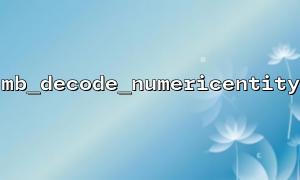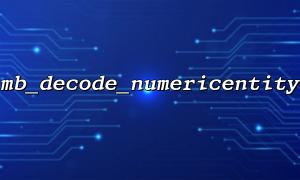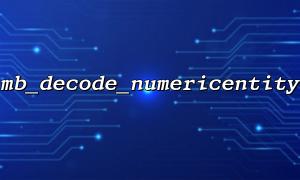During PHP development, dealing with different encodings and character sets is a common challenge. The mb_decode_numericentity() function, part of the mbstring extension, is a very practical tool that converts numeric character entities in HTML into their corresponding characters. For PHP developers working with multilingual encodings, understanding and effectively using mb_decode_numericentity() can help handle complex character decoding tasks more efficiently.
In HTML, character entities are often used to represent special characters, such as & for &, and < for <. These entities start with & and end with ;. Sometimes, you’ll encounter numeric character entities, for example, A represents the character A, and © represents the copyright symbol ?. These numeric entities can be decoded based on a specified encoding, which is exactly what mb_decode_numericentity() is designed to do.
<span><span><span class="hljs-title function_ invoke__">mb_decode_numericentity</span></span><span> ( </span><span><span class="hljs-keyword">string</span></span><span> </span><span><span class="hljs-variable">$str</span></span><span> , </span><span><span class="hljs-keyword">array</span></span><span> </span><span><span class="hljs-variable">$convmap</span></span><span> , </span><span><span class="hljs-keyword">string</span></span><span> </span><span><span class="hljs-variable">$encoding</span></span><span> ) : </span><span><span class="hljs-keyword">string</span></span><span>
</span></span>$str: The input string containing numeric character entities.
$convmap: An array that defines which character entities should be converted and how. It's formatted in groups of three integers that specify the start and end range of the entities and the target character set.
$encoding: Specifies the encoding format, commonly UTF-8 or ISO-8859-1.
Suppose we have a string that contains several numeric character entities:
<span><span><span class="hljs-variable">$str</span></span><span> = </span><span><span class="hljs-string">"Hello &#65;&#66;&#67; World!"</span></span><span>;
</span></span>We want to convert A, B, and C back to their characters A, B, and C using mb_decode_numericentity():
<span><span><span class="hljs-variable">$str</span></span><span> = </span><span><span class="hljs-string">"Hello &#65;&#66;&#67; World!"</span></span><span>;
</span><span><span class="hljs-variable">$convmap</span></span><span> = </span><span><span class="hljs-keyword">array</span></span><span>(</span><span><span class="hljs-number">0x30</span></span><span>, </span><span><span class="hljs-number">0x39</span></span><span>, </span><span><span class="hljs-number">0</span></span><span>, </span><span><span class="hljs-number">0x7F</span></span><span>, </span><span><span class="hljs-number">0</span></span><span>, </span><span><span class="hljs-number">0x7F</span></span><span>); </span><span><span class="hljs-comment">// Numeric range: 0 to 9</span></span><span>
</span><span><span class="hljs-variable">$decoded_str</span></span><span> = </span><span><span class="hljs-title function_ invoke__">mb_decode_numericentity</span></span><span>(</span><span><span class="hljs-variable">$str</span></span><span>, </span><span><span class="hljs-variable">$convmap</span></span><span>, </span><span><span class="hljs-string">"UTF-8"</span></span><span>);
</span><span><span class="hljs-keyword">echo</span></span><span> </span><span><span class="hljs-variable">$decoded_str</span></span><span>; </span><span><span class="hljs-comment">// Output: Hello ABC World!</span></span><span>
</span></span>In this example, we specify the numeric range of character entities from 0 to 9, and A, B, and C are successfully converted to A, B, and C.
$convmap: This array defines the rules for converting numeric character entities. It's composed of groups of four integers:
The first number defines the start of the character entity range.
The second number defines the end of the character entity range.
The third number is the corresponding start value for character conversion.
The fourth number is the corresponding end value for character conversion.
$encoding: This is a crucial parameter because it determines the encoding of the output string. If you're working with UTF-8 text, set it to UTF-8; for ISO-8859-1 text, use ISO-8859-1.
Parsing and Handling HTML Content:
In web development, HTML pages often include various entities, especially those representing special characters or escape sequences. By using mb_decode_numericentity(), we can effectively convert these entities back into readable characters for display or storage.
Handling Encoded Data from External Systems:
Sometimes, developers need to exchange data with external systems that use numeric character entities for text. mb_decode_numericentity() provides a straightforward way to convert those entities back to their original characters.
Ensuring Charset Compatibility on Multilingual Sites:
In multilingual site development, different encodings for character entities can be encountered. mb_decode_numericentity() helps standardize the handling of these entities under a single encoding format, ensuring that characters from various languages are displayed correctly.
mb_decode_numericentity() is a highly useful function, especially when dealing with character entities. It allows developers to decode numeric HTML entities into their original characters, supports multiple encodings, and offers great flexibility. It's widely applicable in web development, cross-system data exchange, and multilingual website projects. Mastering the use of this function can greatly enhance both development efficiency and the robustness of your applications.




